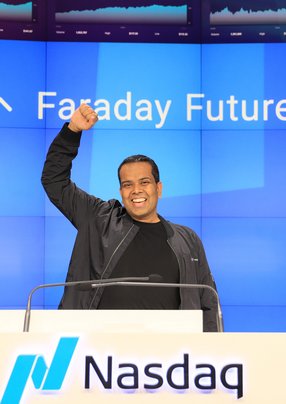
Prashant Gulati
Vice President of Strategy at Faraday Future

Prashant Gulati is the esteemed Vice President of Strategy at Faraday Future. Now in his seventh year with the company, he handles the entirety of its strategic roadmap, which includes overseeing the business plan, mobility initiatives, manufacturing strategy, and directing fundraising efforts.
With over 20 years of success in the technology and automotive industries, Gulati is an accomplished executive with a track record of scaling businesses. He has successfully led a public offering and held leadership roles to drive growth and expansion at several companies globally. In recognition of his industry contributions, Gulati was selected for the coveted Business Insider list of EV Industry Power Players.
Gulati holds a bachelor's degree in computer science and an MBA from the Indian School of Business.
Having grown up in India, Gulati has always had a deep affinity for the environment. This draw of environmental stewardship was heightened when Gulati and his wife were expecting their first child. “I had a sense of urgency to contribute to technology that could help slow climate change and create a better world for our children to grow up in,” he explained.
“I explored numerous fields, including renewable energy, smart grids and energy storage, before focusing on EVs and finding Faraday Future. I immediately clicked with the company as it had such a bold vision and fit the environmentally-focused technological approach I was seeking. My journey into the auto industry has been quite unusual – almost accidental.”
Pride in fundraising
Fundraising is a key part of Gulati’s role: “My proudest professional achievement has been co-leading the IPO process which helped the company raise more than one billion dollars through a listing on NASDAQ,” he says. “I architected our business plan, our equity story, led IPO readiness, roadshows, and advised on core deal terms.”
“That IPO process itself took about a year, working 18-20 hours a day. The process was quite gruelling but very, very fulfilling, ultimately.”
Technological development – the manual way
The best piece of advice Gulati has ever received is to read 500 pages a day. “I don't think I'm able to read 500,” he says. “But I do make sure to read between 200 and 300 pages every day.
“Whether that’s books, magazines, or research papers especially in EVs and Artificial Intelligence. I try to stay in a constant learning process.”
He describes his role as an “expert generalist”. Strategy involves work across different functions: from product, engineering and supply chain, to manufacturing and finance.
“I work across the organisation – just having different points of view is important. I am grateful I have worked with some truly exceptional people.”
Faraday Future: who, what, and why?
“Climate change is the defining challenge of our time, and transportation is one of the largest contributors to it”, says Gulati. “At the same time, the world cannot slow down. We need more growth, more productivity, more time to commit to our passions. So, at Faraday Future, we've been working on the intersection of these problems, of clean mobility and climate change on one hand, and helping people lead productive, connected lives on the other.”
Faraday Future has taken the first step towards achieving that mission by building the FF 91 – which Gulati believes is the most connected, comfortable, and technologically-advanced electric car in the world. The company achieved start of production of the FF 91 in California and plans to sell it through a direct sales model in its dual home bases of the US and China.
“The vision of the company is a lot more than building and selling electric cars, though,” Gulati tells us. “We want to engage our users, build a community, and offer internet and AI services throughout the vehicle lifecycle”
Read the full story HERE.


